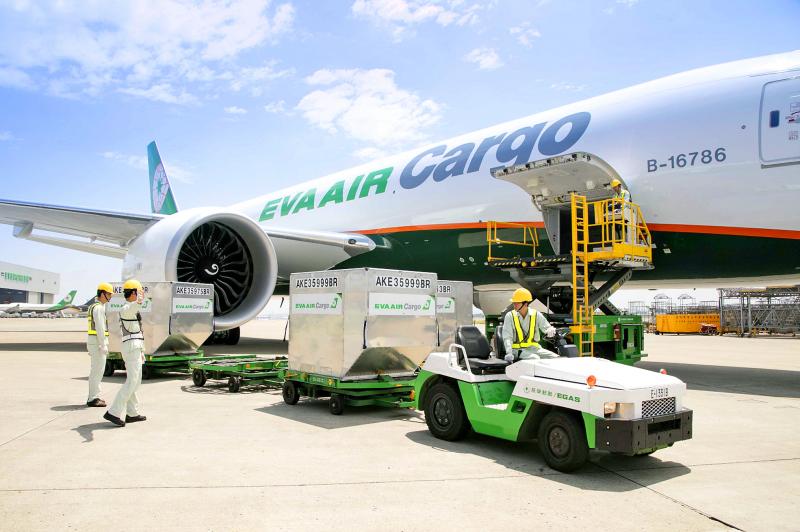EVA Airways Corp’s (長榮航空) board of directors on Friday approved the purchase of a new Boeing Co 777F freighter jet, the airline’s latest effort to boost its cargo capacity after acquired three 777Fs last year.
EVA, which has eight Boeing 777F aircraft, is scheduled to receive its newest addition by the end of next year, it said in a statement.
The plane is to cost about US$417 million, it said.

Photo courtesy of EVA Airways Corp
“The decision [for the purchase] was made because of growth in demand for air cargo, and thus we hope to raise our freight capacity to improve competitiveness and our ability to handle risk,” EVA president Clay Sun (孫嘉明) said.
Sun cited Boeing’s forecast that the compound annual growth rate in the air freight market over the next 20 years would be 4 to 4.6 percent, while the global cargo fleet in 2040 would be 70 percent greater than prior to the COVID-19 pandemic because of sustained demand tied to the expansion of e-commerce and air freight.
“We would also consider next-generation cargo planes for our long-term flight network plans. We hope to adjust our freight network and capacity more flexibly to meet market demand,” Sun said.
EVA has hired Israel Aerospace Industries Ltd to convert three Boeing 700-300ER passenger jets into cargo planes in 2025, bringing the airline’s cargo fleet to 12, Sun said.
EVA in 2020 canceled orders for seven Boeing 787-10 Dreamliner passenger jets, replacing them with orders for three 777F cargo aircraft and four smaller 787-9 passenger jets, it said, adding that it received the cargo planes last year.
EVA reported NT$30.09 billion (US$1.01 billion) in revenue in the first quarter of the year, up 52.9 percent from a year earlier on the back of robust cargo demand. On a quarterly basis, revenue declined 12 percent, company data showed.
The airline posted net profit of NT$3.35 billion in the first three months, compared with net losses of NT$2.2 billion in the same period last year, when passenger revenue plummeted due to pandemic-related border controls.
Earnings per share were NT$0.64 last quarter, compared with losses per share of NT$0.45 a year earlier, data showed.

Stephen Garrett, a 27-year-old graduate student, always thought he would study in China, but first the country’s restrictive COVID-19 policies made it nearly impossible and now he has other concerns. The cost is one deterrent, but Garrett is more worried about restrictions on academic freedom and the personal risk of being stranded in China. He is not alone. Only about 700 American students are studying at Chinese universities, down from a peak of nearly 25,000 a decade ago, while there are nearly 300,000 Chinese students at US schools. Some young Americans are discouraged from investing their time in China by what they see

MAJOR DROP: CEO Tim Cook, who is visiting Hanoi, pledged the firm was committed to Vietnam after its smartphone shipments declined 9.6% annually in the first quarter Apple Inc yesterday said it would increase spending on suppliers in Vietnam, a key production hub, as CEO Tim Cook arrived in the country for a two-day visit. The iPhone maker announced the news in a statement on its Web site, but gave no details of how much it would spend or where the money would go. Cook is expected to meet programmers, content creators and students during his visit, online newspaper VnExpress reported. The visit comes as US President Joe Biden’s administration seeks to ramp up Vietnam’s role in the global tech supply chain to reduce the US’ dependence on China. Images on

New apartments in Taiwan’s major cities are getting smaller, while old apartments are increasingly occupied by older people, many of whom live alone, government data showed. The phenomenon has to do with sharpening unaffordable property prices and an aging population, property brokers said. Apartments with one bedroom that are two years old or older have gained a noticeable presence in the nation’s six special municipalities as well as Hsinchu county and city in the past five years, Evertrust Rehouse Co (永慶房產集團) found, citing data from the government’s real-price transaction platform. In Taipei, apartments with one bedroom accounted for 19 percent of deals last

US CONSCULTANT: The US Department of Commerce’s Ursula Burns is a rarely seen US government consultant to be put forward to sit on the board, nominated as an independent director Taiwan Semiconductor Manufacturing Co (TSMC, 台積電), the world’s largest contract chipmaker, yesterday nominated 10 candidates for its new board of directors, including Ursula Burns from the US Department of Commerce. It is rare that TSMC has nominated a US government consultant to sit on its board. Burns was nominated as one of seven independent directors. She is vice chair of the department’s Advisory Council on Supply Chain Competitiveness. Burns is to stand for election at TSMC’s annual shareholders’ meeting on June 4 along with the rest of the candidates. TSMC chairman Mark Liu (劉德音) was not on the list after in December last